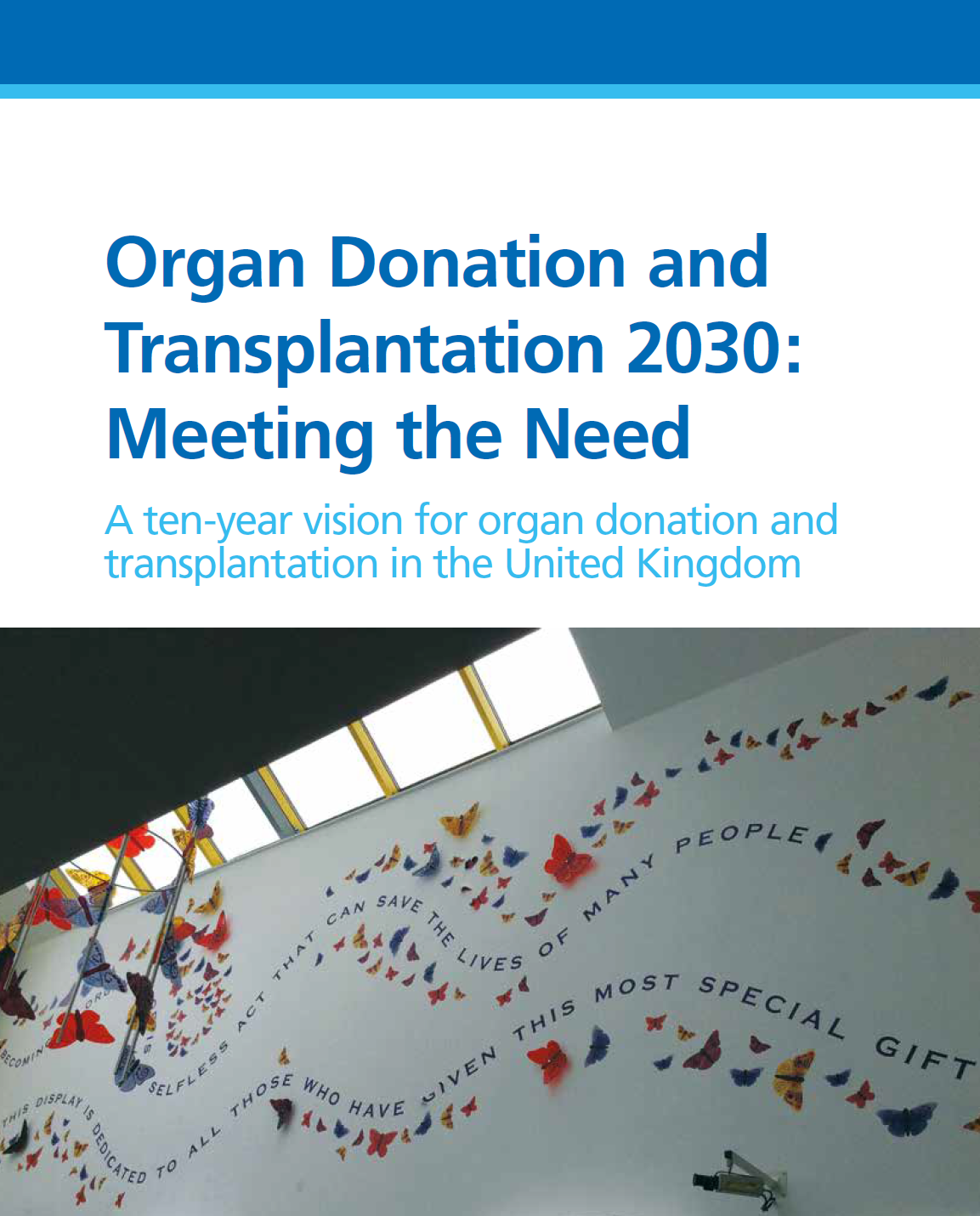New UK strategy sets out ambition to be world leaders in organ donation and transplantation
Increasing consent rates for organ donation and making the most of donated organs for transplant are the two key aims set out in a new UK wide organ donation strategy.
 The Organ Donation and Transplantation: Meeting the Need strategy launched today (1 June) and sets the ambition for the next 10 years, building upon past successes while planning service improvements for the future.
The Organ Donation and Transplantation: Meeting the Need strategy launched today (1 June) and sets the ambition for the next 10 years, building upon past successes while planning service improvements for the future.
The new strategy, supported by all four UK Health Ministers, sets out the vision for the UK to be a world-leader in organ donation and transplantation.
This is also the first time deceased and living organ donation has been brought together into one strategy. It follows the Taking Organ Transplantation to 2020 strategy and the Living Donor Kidney Transplantation 2020 strategy which were launched back in 2013/14.
Since then the UK has made a step change in increasing the number of both living and deceased organs donated and transplanted, but there is still more work to do.
While the number of donors has risen considerably in recent years, the number of organs transplanted has not increased at the same rate, as more organs are not of a suitable quality for transplant.
In fact, for the last two years there has been a drop in the number of organs suitable for transplant. Several factors, including an increase in the average age of donors and other lifestyle factors, has led to this decline in organ utilisation.
Driving innovation
The donation and transplant community across the UK is focused on responding to these challenges for organ utilisation.
New technologies, such as DCD heart retrieval and normothermic perfusion for livers, designed to boost and maintain organ quality during the retrieval process, are playing an increasingly crucial role.
This new strategy sets the agenda for continuing to utilise new technology and innovation to help increase both organ donation and transplantation rates, taking them to world class standards over the next ten years.
The main aims of the strategy are simple; to increase organ donation and increase organ transplantation.
Areas for action
The six key areas for action are:
- For living and deceased donation to become an expected part of care, where clinically appropriate, for all in society
- For optimal organ utilisation in every organ group, benefitting from new technologies and techniques
- To make the most effective use of a precious donor organ, ensuring that recipient outcomes are amongst the best in the world
- To enable people of all backgrounds and circumstances to have timely access to the organ they need
- To secure a sustainable service across the UK, making the most of every opportunity for a donation and a transplant, as donation numbers increase due to the new legislation
- To build a pioneering culture of research and innovation in donation and transplantation in the UK
Betsy Bassis, Chief Executive of NHS Blood and Transplant said:
“This new strategy sets out our ambitions to be world leaders in organ donation and transplantation.
“We aim to balance the evolution of current best practice with a revolution in new technologies and research to deliver real improvements for people in need of a transplant.
“Despite significant progress, there remain substantial challenges – and opportunities – to securing a suitable organ for everyone who needs a transplant.
“Some initiatives from the previous strategies will continue, whilst we look to implement new ones with the potential to increase the numbers of both living and deceased donation. These will, in turn, deliver real improvements for people in desperate need of a transplant.”
Anthony Clarkson, Director of Organ and Tissue Donation and Transplantation at NHS Blood and Transplant said:
“There is no doubt that this is an ambitious strategy, but we need to be ambitious and set the bar high if we are going to achieve our aim of saving even more lives by designing the very best organ donation and transplantation service in the world.
“The strategy brings together living and deceased donation for the first time and relies on all those in the donation and transplant community across the UK to deliver it.
“There is a genuine desire to ensure that every donation opportunity is taken, and that every precious donated organ that can be safely transplanted to save and improve someone’s life, is transplanted.”
Making progress
Across the UK, great progress has been made in the consent/authorisation rate for patients eligible for donation after circulatory death (DCD) with the rate increasing from 51% in 2013 to 65% in 2019/20, while agreement for donation following brain-stem death (DBD) increased from 68% to 72% over the same period.
The demand for organ transplants remains high and people across the UK still die every day because the organ transplant they need does not arrive in time.
Over the next decade there will need to be an additional 2400 organs available every year for transplant in order to meet the need of those who are actively waiting for lifesaving transplants.
The law change
One of the most significant events to occur in 2020, despite the global COVID-19 pandemic, was the change in the law on organ donation in England to an ‘opt out’ system.
This follows the successful implementation in Wales in 2016 and Scotland followed in March 2021. Northern Ireland are also in consultation on the idea.
It’s hoped that within the first five years of the strategy, in those areas of the UK where the ‘opt out’ legislation has been implemented, it will enable a gradual increase in consent/authorisation rates from donor families across the UK to an overall average of 80%.
A focus on diversity and inclusion
Diversity and inclusion are a key priority in the new strategy. Surveys show that families from Black, Asian and minority ethnic backgrounds are less likely to discuss organ donation and are much more likely to decline the option of organ donation when offered the opportunity to donate.
Proportionately, more people from ethnic minorities need transplants than the rest of the UK population. In 2020, a third of the people in the UK waiting for a transplant were from a BAME background, though they make up just 14% of the total UK population.
Much is being done to address this issue, but there is more to do working in partnership with charities, stakeholders, community groups and clinical teams to close the gap between those from BAME communities willing to donate and those in need of a transplant.
Find out more about the Organ Donation and Transplantation: Meeting the Need strategy
Statements of support for the strategy
Minister for Health in Northern Ireland Robin Swann MLA
“We welcome this new ambitious strategy which will help build on the significant progress that has already been achieved in organ donation and transplantation.
“In Northern Ireland we have recently consulted on the introduction of an opt-out system for organ donation that I hope will lead to more organs being made available while also aligning to the aims of the new strategy.
“This piece of work is vital and will help those who are waiting on an organ that will help transform or save their life.”
Scottish Minister for Public Health, Women’s Health and Sport Maree Todd
“The publication of this strategy indicates the dedication of all four nations of the UK to increase organ donation and transplantation to help improve and save lives.
“The evidence so far of the success of the opt out system in Wales and England provides encouraging signs that the recently introduced opt out system in Scotland will be a positive addition to the measures in place.
“While this strategy sets out key recommendations to be progressed across the UK we have also developed a Donation and Transplantation Plan for Scotland which sets out a number of additional actions to further increase access to transplantation for people living in Scotland.”
Welsh Government Health Minister Eluned Morgan
“We are immensely proud to have led the way with the introduction of a soft opt-out system of consent for organ donation in Wales and are determined to support strategies to improve donor rates.
“We endorse the Organ Donation and Transplantation: Meeting the Need strategy and hope it significantly boosts organ donation and transplantation across the UK.
“Cardiff Transplant Unit have often led the way not only with pioneering new techniques but also with rates of transplantation and outcomes. We are incredibly proud of their achievement and hope this new strategy will help.
“It is important we work together and ensure everything possible is being done, not just to improve quality of life, but save lives too.”
Secretary of State for Health and Social Care Matt Hancock
“The need for organ donors unites us all and NHS Blood and Transplant have had incredible success in boosting donation numbers and ensuring life-saving organs reach all four corners of the UK over the past decade, helping to save thousands of lives annually.
“This past year has demonstrated the importance of collaboration between national health services to save lives and help society’s most vulnerable.
“This new strategy will build on these achievements, and make the UK a global example for organ donation.
“I’m proud that we now have an ‘opt out’ system so more people can access a lifesaving transplant. It is vital we keep working together to raise awareness and start conversations.”

